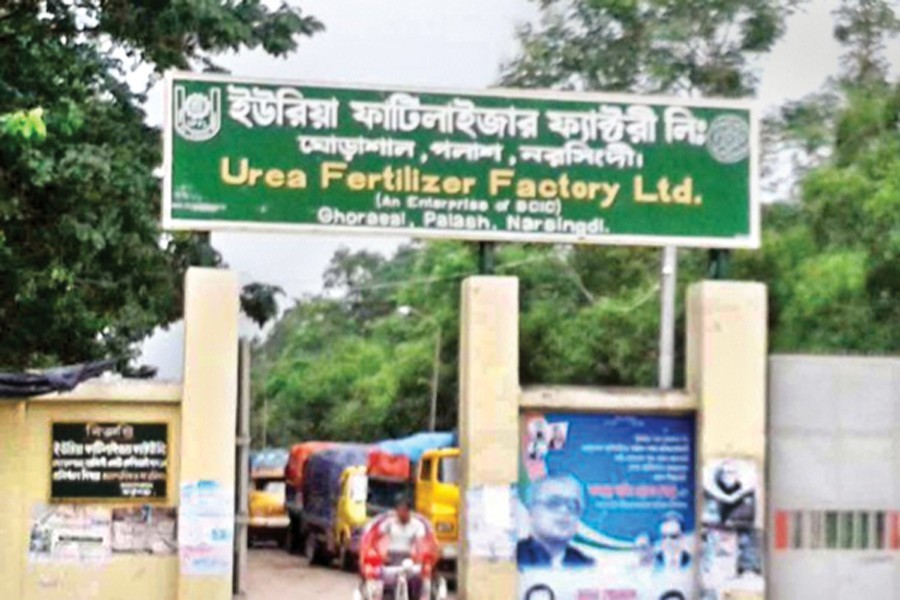Ghorasal Urea Fertiliser Factory shuts, finally
BCIC finds production economically unviable

Published :
Updated :

The authorities concerned have permanently shut one of the country's biggest urea fertiliser plants at Ghorasal in Narsingdi district putting an end to the production at five-decade-old factory, officials said.
The decision came after the Bangladesh Chemical Industries Corporation (BCIC) found that production at the unit 'is not viable environmentally and economically'.
Sources at the BCIC also said environmental concerns raised by Multilateral Investment Guarantee Agency (MIGA), the foreign investors' guarantee agency, over building a mega urea fertiliser factory on the site of Ghorasal and Palash urea manufacturing units also led the authority to take the decision.
When contacted, BCIC chairman Md. Haiul Quaium said they have decided to permanently shut Urea Fertiliser Factory Limited (UFFL) at Ghorasal in the greater interest of building a mega unit there.
"To this effect, we'll issue a letter within a couple of days," he added.
The chairman of the country's largest corporation said they analysed financial and environmental performances of the unit before taking the decision.
He said the unit that lost its economic life several decades ago kept incurring financial losses for years because of higher costs of production. At the same time, it has been causing air and water pollution severely.
Mr. Quaium said they would build a mega factory involving around Tk 105 billion (US$ 1.2 billion) there after dismantling Palash and Ghorasal units. Palash urea factory has already been shutdown.
"It (Ghorasal unit) needs to be shut down for implementation of the mega project. So, we have taken the decision in the greater interest of the project," he said.
About the future of staffers working at Ghorasal plant, he said they would reappoint them to the existing vacant posts of the corporation. Manpower would also be needed for the mega project.
"We'll engage a good number of them in the project," he added.
BCIC director (finance) Md. Belal Hossain said they run the decades-old Ghorasal UFFL through patchwork for years to avert the mismatch between the supply and demand of the key agricultural input.
But productivity kept declining while its costs continued soaring, making things difficult for the BCIC to keep its production running further, he said.
Citing official statistics of the factory, he said average daily production of the unit went down to 525 tonnes against the installed capacity of 1,136 tonnes.
On the other hand, he said, production cost of fertiliser is estimated at Tk 40,466 per tonne, which is almost double than standard cost (around Tk 22,000).
In terms of financial performance, according to the BCIC, Ghorasal UFFL spent Tk 2.70 billion against its earnings of Tk 910.15 million in eleven months of the last fiscal year (FY'19).
Seeking anonymity, a BCIC official said some investors have appointed MIGA as their guarantee agency for the mega project named Ghorashal Palash Urea Fertiliser Project (GPUFP).
He said it has recently raised concern over severe air and water pollution in the Ghorasal area, asking the BCIC to let them know how to bring down the pollution level in accordance with the World Bank's standard - 25 ppm for air and 30 ppm for water.
"It is not possible for the BCIC to maintain that by keeping its (Ghorasal) production running. This is the prime reason behind the closure of the unit as the factory was running for many years even though it was incurring losses," he added.
Talking to the FE, managing director of Ghorasal UFFL Md. Monirul Islam said he has not yet received any letter regarding the matter.
"So, I don't want to make any comment on the issue. It is the matter of the BCIC and the ministry concerned. If it decides to shut it, we will do the job accordingly," he said.
About poor financial performance, he said he was made MD of the unit recently. "The factory is too old that consumed more gas to produce fertiliser."
The unit has also pending gas bill worth Tk 300 million and the gas average consumption for producing a tonne of fertiliser is estimated to be 71 mmcf against the standard consumption of 41mmcf.
A total of 816 people, including 134 officers and 203 employees, were working at the unit established on the eastern bank of the River Sitalakhya in 1970.
jubairfe1980@gmail.com


 For all latest news, follow The Financial Express Google News channel.
For all latest news, follow The Financial Express Google News channel.